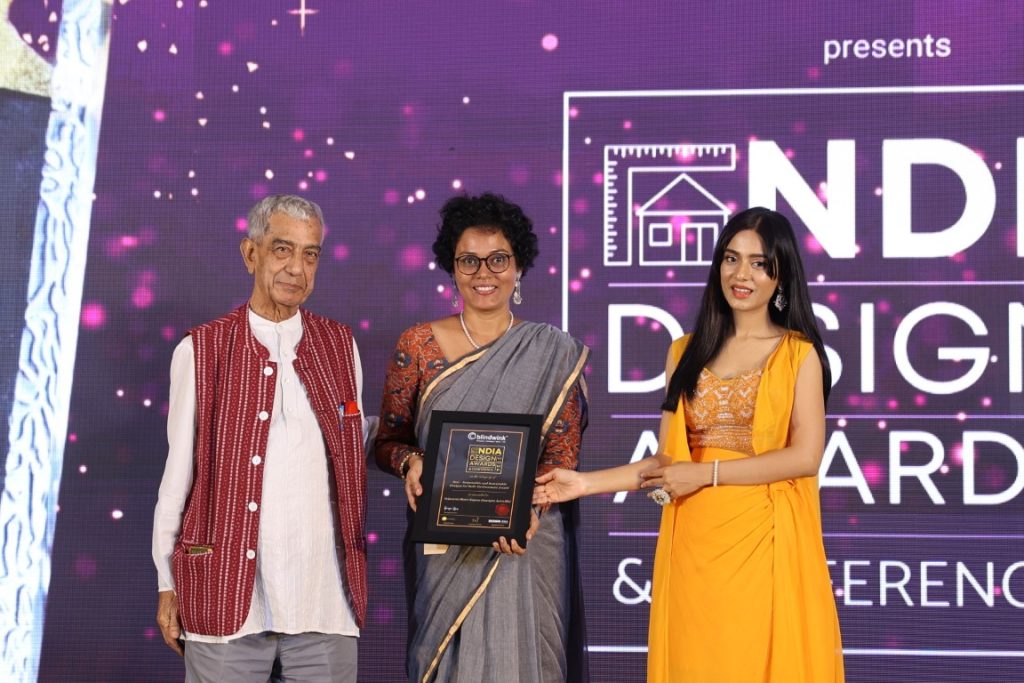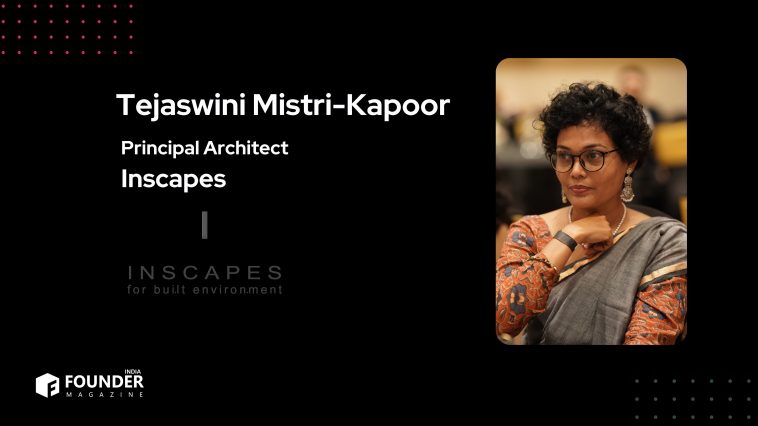In the vibrant and evolving world of architecture, where form meets function and creativity intersects with practicality, one name that stands out is Tejaswini Mistri-Kapoor. As the Principal Architect and founder of Inscapes, a design studio nestled in the conscious community of Auroville, Tamil Nadu, Tejaswini’s journey is as inspiring as it is unique. With a deep commitment to sustainability, holistic design, and a philosophy rooted in harmony with nature, she has dedicated her career to creating spaces that do more than serve functional needs—they nurture, inspire, and sustain.
A Passion Born from Curiosity
Tejaswini’s foray into architecture was driven by an innate sense of curiosity and a profound desire to pursue a meaningful profession. From an early age, she was captivated by the intricate relationship between form, function, and space. Whether sketching designs or imagining new ways to blend aesthetics with utility, her passion for architecture was evident.
Interestingly, Tejaswini’s initial aspiration was to study psychology. She believed that understanding the human mind could provide her with the tools to contribute positively to society. However, a lack of guidance in this field led her to explore architecture, where her keen eye for design and her desire to impact the world meaningfully found a perfect outlet. Architecture, for Tejaswini, became a powerful tool to address social and environmental challenges, allowing her to merge creativity with a deep sense of purpose.
Her journey took a significant turn when she moved to Auroville, an international township dedicated to human unity and sustainable living. For over two decades, Auroville has been more than just a place of residence for Tejaswini; it has been a profound influence on her professional growth and design philosophy. The town’s ethos of conscious living, respect for nature, and emphasis on community-centric development resonated deeply with her, shaping her approach to architecture and ultimately leading her to establish her own studio, Inscapes, in 2011.
The Auroville Influence: A Foundation for Conscious Design
Auroville’s influence on Tejaswini’s work is unmistakable. The township, with its experimental approach to sustainable living and its emphasis on human unity, provided her with a unique perspective on how architecture could be more than just the construction of buildings. For Tejaswini, it became a medium through which she could contribute to the well-being of both people and the planet.
The design philosophy at Inscapes is deeply rooted in the principles of sustainability and holistic design, principles that Tejaswini embraced during her time in Auroville. Her vision was to create spaces that harmonize with their environment, enhance human experience, and foster a sense of community. This vision is reflected in every project that Inscapes undertakes, whether it’s a residential building, a community center, or a piece of custom furniture.
Tejaswini’s commitment to sustainability extends beyond architecture into furniture design as well. In 2012, she launched Woodscapes, a furniture brand that exemplifies her dedication to eco-friendly design. The venture was born out of a natural disaster—a cyclone that felled numerous trees in Auroville. Instead of letting the wood go to waste, Tejaswini saw an opportunity to create something beautiful and functional. Woodscapes is characterized by its minimalism, use of natural materials, and a profound respect for the environment. The brand’s philosophy is inspired by the legendary woodworker George Nakashima, whose belief in honoring the natural beauty and imperfections of wood resonates deeply with Tejaswini.
Challenges of Entrepreneurship: Balancing Creativity and Business
Starting and running a business, especially in a creative field like architecture, comes with its own set of challenges. For Tejaswini, one of the most significant struggles has been balancing creativity with the demands of running a business. While her architectural education prepared her to plan and manage projects efficiently, the financial management aspect of business proved to be more complex and time-consuming.
Moreover, finding clients who share her philosophy of achieving a balance between human needs, nature, and economy has been a persistent challenge. Tejaswini’s work is deeply rooted in sustainability and human-centered design, which sometimes requires clients to adjust their expectations and align with her vision. Despite these challenges, Tejaswini remains committed to her principles, constantly striving to integrate sustainable practices into her projects.
To navigate these challenges, Tejaswini employs several strategies. One of these is the Integrative Design Process, which involves a collaborative approach to planning that considers social, environmental, and economic factors. This holistic method ensures that all aspects of a project are aligned with the broader goals of sustainability and community well-being.
Sustainable practices are another cornerstone of Inscapes’ design approach. Tejaswini focuses on creating environmentally responsible and resource-efficient buildings. This includes designing spaces that maximize energy efficiency through passive solar principles, using high-performance insulation, and incorporating renewable energy sources such as rooftop solar panels. Water conservation is also a key consideration, with projects often featuring rainwater harvesting systems, greywater recycling, and drought-resistant landscaping.
Human-centered design is yet another strategy that sets Inscapes apart. Tejaswini ensures that her designs promote comfort, health, and well-being by considering factors like natural lighting, ventilation, acoustics, and thermal comfort. For larger projects, she involves the local community in the planning process to ensure that the project meets their needs and enhances their quality of life. This participatory approach fosters a sense of ownership and connection between the community and the built environment.
Nature integration is also central to Inscapes’ philosophy. Tejaswini believes in integrating natural elements into the design to connect occupants with nature. This can include green roofs, living walls, indoor plants, and the use of natural materials. Buildings are designed to respond to the local climate and geography, with careful consideration given to orientation, natural light, and ventilation.
Signature Projects: A Commitment to Sustainability
Among the many projects that Inscapes has undertaken, one that stands out as particularly close to Tejaswini’s heart is the Golven Beach Resort in Vengurla. This project was unique in many ways, not least because it was located in an ecologically sensitive area within the Coastal Regulation Zone (CRZ). The site, right on the beach, presented both opportunities and challenges. The goal was to create a resort that preserved the natural dunes while still offering guests unobstructed views of the ocean.
To achieve this, Tejaswini and her team used only local materials such as laterite, bamboo, and thatch. Remarkably, the entire project was completed without the use of cement, highlighting the role of design in overcoming material constraints. The result was a resort that not only blended seamlessly with its surroundings but also set a new standard for sustainable architecture in ecologically sensitive areas.
The Growing Trend of Sustainable Architecture
The trend towards sustainable and green architecture is gaining momentum globally, and Tejaswini is at the forefront of this movement in India. However, she is quick to caution against superficial “greenwashing,” where sustainable practices are promoted in name only without substantial impact. For Tejaswini, true sustainability requires a deep and genuine commitment to environmental principles that go beyond aesthetics or token gestures.
At Inscapes, sustainability is integrated into every stage of the design process, from site selection and material choice to the final touches. Tejaswini believes that sustainable architecture must make a significant, authentic impact, creating buildings that are not only environmentally responsible but also economically viable and socially beneficial. This holistic approach ensures that the trend towards sustainability in architecture leads to real, meaningful change in the built environment.
The Importance of Understanding Client Psychology
While technical knowledge and skill are crucial in architecture, Tejaswini emphasizes the importance of understanding client psychology. Architecture projects often span several years, and throughout this time, clients are not just passive observers but active participants in the process. Tejaswini treats her clients as team members, involving them in the decision-making process and ensuring that their needs, preferences, and cultural backgrounds are reflected in the final design.
This approach is particularly important because buildings and spaces are more than just physical structures—they are environments where people live, work, and play. By understanding the psychology of her clients, Tejaswini is able to create spaces that evoke positive emotions and enhance well-being. However, she also believes that this understanding must be mutual; clients should be open to aligning with the architectural vision to create truly meaningful spaces.
Lessons from a Lifelong Journey in Architecture
With nearly two decades of experience in the field, Tejaswini has learned many valuable lessons from her journey as an architect and entrepreneur. Perhaps the most important lesson is the need for resilience and patience. Architecture projects are often long-term endeavors, requiring careful navigation through various challenges, from design and construction obstacles to client expectations.
Tejaswini has also learned to trust her creative abilities and decision-making skills. The architecture profession is a vast and complex field that blends art, science, and business. It requires a diverse skill set and a commitment to lifelong learning. Over the years, Tejaswini has honed her sensitivity to cultural and local contexts, which has enriched her designs and deepened her connection to the communities she serves.
A Message to Budding Architects and Designers
To aspiring architects and designers, Tejaswini offers some sage advice: never stop asking questions. Curiosity, she believes, is the engine of creativity. Exploring new materials, studying diverse architectural styles, and immersing oneself in different cultures are all essential to developing a rich and varied design palette.
Tejaswini also emphasizes the importance of respecting the environment and designing with people in mind. Empathy is a powerful tool in architecture, helping designers create spaces that enhance well-being and foster community. In an era where Artificial Intelligence is becoming increasingly prevalent, she encourages young architects to use AI wisely but not to become slaves to it. Creativity, emotions, and intuition are irreplaceable elements of design that should never be overlooked.
Finally, Tejaswini urges young designers to let their passion for design be their guiding light. When you love what you do, it shows in your work. Passion fuels creativity, drives innovation, and inspires others. The journey of an architect or designer is just beginning, and the future is full of possibilities. Tejaswini’s message is clear: embrace the challenges, celebrate the victories, and never lose sight of the impact your work can have on the world.
The Legacy of Inscapes

As Tejaswini Mistri-Kapoor continues to lead Inscapes into the future, her commitment to sustainability, community-centric design, and human-centered architecture remains unwavering. Through her work, she is not only shaping the built environment but also inspiring a new generation of architects and designers to think beyond the conventional, to innovate, and to create with intention and integrity. The legacy of Inscapes is one of thoughtful, responsible, and impactful design—a legacy that will undoubtedly influence the architectural landscape for years to come.


